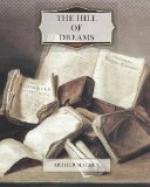II
Lucian was growing really anxious about his manuscript. He had gained enough experience at twenty-three to know that editors and publishers must not be hurried; but his book had been lying at Messrs Beit’s office for more than three months. For six weeks he had not dared to expect an answer, but afterwards life had become agonizing. Every morning, at post-time, the poor wretch nearly choked with anxiety to know whether his sentence had arrived, and the rest of the day was racked with alternate pangs of hope and despair. Now and then he was almost assured of success; conning over these painful and eager pages in memory, he found parts that were admirable, while again, his inexperience reproached him, and he feared he had written a raw and awkward book, wholly unfit for print. Then he would compare what he remembered of it with notable magazine articles and books praised by reviewers, and fancy that after all there might be good points in the thing; he could not help liking the first chapter for instance. Perhaps the letter might come tomorrow. So it went on; week after week of sick torture made more exquisite by such gleams of hope; it was as if he were stretched in anguish on the rack, and the pain relaxed and kind words spoken now and again by the tormentors, and then once more the grinding pang and burning agony. At last he could bear suspense no longer, and he wrote to Messrs Beit, inquiring in a humble manner whether the manuscript had arrived in safety. The firm replied in a very polite letter, expressing regret that their reader had been suffering from a cold in the head, and had therefore been unable to send in his report. A final decision was promised in a week’s time, and the letter ended with apologies for the delay and a hope that he had suffered no inconvenience. Of course the “final decision” did not come at the end of the week, but the book was returned at the end of three weeks, with a circular thanking the author for his kindness in submitting the manuscript, and regretting that the firm did not see their way to producing it. He felt relieved; the operation that he had dreaded and deprecated for so long was at last over, and he would no longer grow sick of mornings when the letters were brought in. He took his parcel to the sunny corner of the garden, where the old wooden seat stood sheltered from the biting March winds. Messrs Beit had put in with the circular one of their short lists, a neat booklet, headed: Messrs Beit & Co.’s Recent Publications.
He settled himself comfortably on the seat, lit his pipe, and began to read: “A Bad Un to Beat: a Novel of Sporting Life, by the Honorable Mrs. Scudamore Runnymede, author of Yoicks, With the Mudshire Pack, The Sportleigh Stables, etc., etc., 3 vols. At all Libraries.” The Press, it seemed, pronounced this to be a “charming book. Mrs. Runnymede has wit




